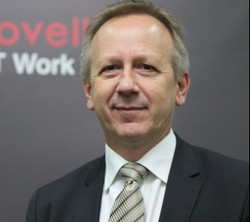The Attachmate Group’s enterprise software business unit NetIQ is betting big on the Indian market. In an exclusive interview with Firstbiz.com, Borris Ivancic, VP & GM, APAC, NetIQ and Venkatesh Swaminathan, country head, The Attachmate Group, India, shared about the company’s strategy for the Indian market and how India’s maturing compliance regulatory regime around the BFSI segment is opening up opportunities for the company’s security and identity products. Excerpts from the interview:
Can you brief us about NetIQ India operations in terms of offices, employees, and R&D?
Swaminathan: India is one of the biggest development centre for The Attachmate Group, a US-based software holding company which includes Novell, SUSE, and NetIQ. The R&D strength is about 700+ employeeswith a development centre in Bangalore. The centre is focused on product development for NetIQ and Novell brands. We have sales offices in Mumbai, Delhi, Chennai and Kolkata apart from Bangalore.
[caption id=“attachment_112374” align=“alignleft” width=“250”]  Borris Ivancic, VP & GM, APAC, NetIQ[/caption]
How important is India as a market for NetIQ, and why? What kind of market opportunities do you see here?
Ivancic: We see things with the India market that are particularly positive with NetIQ, especially in some of the things that are happening in the banking and finance industry (BFSI), and the whole compliance regulatory regime around these industries that really suit our security products very well.
The market is not as mature as markets in the US, Europe, and Australia, but we see some real opportunities to invest in India. We have changed the structure of our sales skills in India over the last two years to have more expertise around identity and security products.
Swaminathan: NetIQ is a significant business for us in India. We have seen some large wins across our portfolio of offerings fromIdentity and Access management to disaster recovery. We are working on offering DRaaS (DR as a service) model to the customers. The IDAM (Identity and access management) marketisnascent in India and unfortunately the vendors are trying to selllarger solutions than what is required by the customer community and hence we see some resistance in the buying patterns.
Which all sectors are you targeting in India? Can you name some of your key clients here?
Swaminathan: There’s big opportunity in India for us to provide solutions in the growing market particularly in the finance industry. Our key focus segments are enterprise, BFSI, Government, and IT/ITES. We have seen some big value wins in these sectors. One of our major wins is withthelargest public sector trading house in the country, and another one is with a bigIndian consumer conglomerate. We also have some significant wins with Government, one being with Electronics Corporation of Tamil Nadu (ELCOT). The others include ITC, BSE, Air India, Geojit Paribas to name a few.
[caption id=“attachment_112375” align=“alignright” width=“250”]  Venkatesh Swaminathan, country head, The Attachmate Group, India[/caption]
What are your USPs and also what gives NetIQ competitive advantage over larger rivals?
Swaminathan: Our approach is to go modular. We offer solutions that meet the current need of the customers rather than the entire stack. We believe in starting small with one step at a time and join the customer in his journey. For instance, we met a few customers who were looking at a solution that could assist in the employees being able to do a self-password reset but some of the vendors tried selling theentire IDM stack to thembut when we metthem and proposed our solution which was one-third the cost, the customers were taken by surprise.
We areeducating the market where we work as a partner to the customer,understandtheir problems step by step, do a POC, and ensure that the problem ishandled and then move on with the next issue that the customer needs help with. This is our key strength.
Most of the product development for new products happens from the India development centre. In-fact, that again gives us an edge as we can look at doing customizations as per the customer’s demands.
Ivancic: We are big enough to be safe, and small enough to be agile and nimble and flexible with our customers.
How are you performing in India in terms of growth rate, market share, revenues etc?
Ivancic: In India, we are doing very well and this market accounts for 10 percent of our total revenue in Asia Pacific region. And, we are hoping that that will grow to about 15 percent as the business grows overall.


)
)
)
)
)
)
)
)
)



